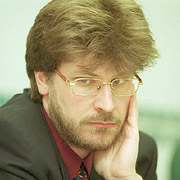© «Russia in Global Affairs». № 1, January — March
2006

This year will mark 15 years since the breakup of the Soviet
Union, a dramatic event whose aftermath will determine the course
of world history for a long time. For Russia, the last of the great
European empires, the disappearance of its traditional sphere of
influence has come as a serious test. This process, however, was
painful for all empires of the past.
What is strange, however, is that Russia is only now beginning
to experience what is usually described as post-imperial syndrome:
in the 1990s, the shock accompanying the collapse of the Soviet
Union was so great that the people focused all their efforts on
survival in the new environment. Moreover, Russian society and its
elite believed for quite a long time in an inevitable reunification
of the former Soviet republics into a single state. Today, the
problem of survival is not that acute, while developments in the
post-Soviet space have dispelled any hope for reintegration. Time
has come to rethink the new reality.
Since time immemorial, the leaders of empires were convinced
that the laws of global development, which caused other empires to
break up, did not apply to their own empire, argues Alexei Arbatov
in this issue. History, however, has repeatedly refuted that
self-assurance. In another essay, Portugal’s ex-president Antonio
Ramalho Eanes analyzes peculiarities of the post-imperial
consciousness. However different Russia and Portugal may be, they
have faced similar psychological problems. The experience of our
“companion in distress” suggests an important conclusion, namely
that a farewell to empire, however bitter, disappointing or unfair
it may seem, is an inevitable stage in a country’s development. Yet
the life of a nation does not stop at that point; there is always a
possibility to restore its influence and take on a new role in the
world – sometimes independently, and sometimes by joining an
alliance with other countries. But to take avail of this
possibility, a country requires sober analysis. It needs the
ability to look into the future, rather than into the past, and to
formulate clearly its prospects instead of lamenting its past
glory.
In this issue, our contributing authors focus their analysis on
how Russian society is coping with the challenges in this time of
change. Sergei Dubinin, one of the architects of economic reforms
in Russia, analyzes the lessons of the Russian revolution, which
has turned traditional life upside down without reaching its
logical end. Social scientist Lev Gudkov raises the issue of
nationalism and xenophobia, which often are a reaction to the
collapse of the established national identity. Scholar Sergei
Gradirovsky proposes a radical new strategy for Russia: instead of
pursuing the traditional policy of “gathering together lands,” he
suggests “harvesting new peoples” in order to revive the
nation.
Alexander Arbatov, Maria Belova and Vladimir Feygin write about
Russia’s hydrocarbon potential, which is increasingly projected as
the main instrument for Russia retaining its great-power status in
the 21st century.
Russian veteran politician Yevgeny Primakov comments on
Russian-U.S. relations and describes as shortsighted those American
politicians who “have excluded Russia from the list of great powers
and underestimate the dynamics and prospects of its
development.”
The Russia-Belarus Union, proclaimed by the two countries in the
mid-1990s, was considered by many as a prototype of a powerful
future association that would again be centered around Russia.
Belarusian economist Leonid Zaiko analyzes the present state of
affairs in relations between the close allies.
Historian Sergei Markedonov focuses on one of the most sensitive
problems inherited from the Soviet Union – breakaway entities on
the territory of Georgia, Azerbaijan and Moldova. Political
scientists Vladimir Degoyev and Rustam Ibragimov warn about threats
to Russia’s territorial integrity, which stem from the difficult
situation in the Caucasus. Diplomat Stanislav Chernyavsky has
contributed an extensive analysis of the situation in Central Asia
and Russia’s chances to restore its former influence in the
region.
Mikhail Margelov, a member of Russia’s Federation Council,
comments on the strained relations between Russia and the Council
of Europe. Russian scholar Vladislav Inozemtsev and British
economist Micґa Panicґ discuss in their articles various aspects of
globalization. Finally, our Personage section provides an interview
with the leading U.S. social scientist, Michael Walzer.










